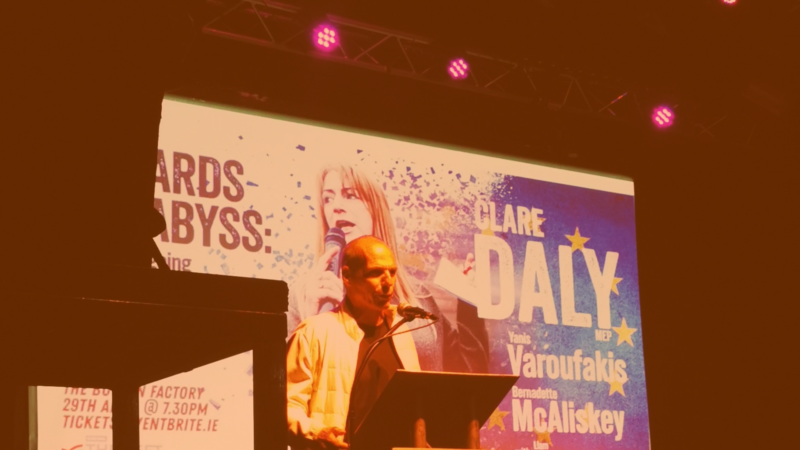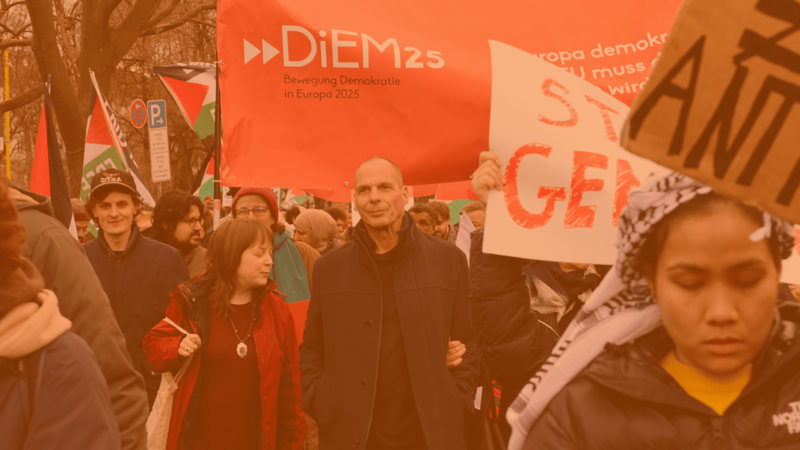Europe has proved far more adept at building walls than the former US president was
The week started ominously with a French journalist asking me whether the Greeks have turned cold-hearted, alluding to the apparent apathy to the drowning of hundreds of refugees off the coast of the Peloponnese and to the murky role played in this tragedy by our Coastguard. Yes, I replied without a second thought. A population that has been brutalised by 13 years of crisis, whose median per capita real incomes are now 40 percent lower than in 2007, and whose democracy was crushed in 2015 (when their brave referendum vote was ignored) have become too numb and too cynical to care even about their own rights. How else can one explain the recent electoral triumph of a Prime Minister who had been caught red-handed eavesdropping on political opponents, even on members of his cabinet and the top brass of our armed forces?
Build the Wall!
Pollsters informed me that a chief reason our party, MeRA25, fared badly in the recent general election was our opposition to the Wall on our border with Turkey. My mind raced to the 2016 mass rallies addressed by a Donald Trump screaming “Build the Wall!” at the top of his voice. Back then, Europeans looked at him with disdain. Since then, Europe has proven far more adept at building Border Walls than Trump ever was. On the Greek-Turkey border, in Spain’s Moroccan enclave, on the eastern borders of Hungary and Romania, in the midst of Libya’s desert, the European Union has funded the erection of abominations that should fill Trump’s heart with envy. Are we not great hypocrites? And for what? For a thousand years we exported millions of migrants, often armed to the teeth, to the globe’s four corners. Now that Europe is aging, the migratory flows have reversed. We have a pressing need for many migrants every year. Instead of welcoming people willing to spend thousands of dollars to risk life and limb to get here, we fence them off and push their boats back into the stormy seas. Nothing but racism can explain this.
Technofeudalism
I spent most of the week locked up in a studio recording the audiobook of my forthcoming Technofeudalism: What killed capitalism. It was hard work and great fun to read out loud a book which, while written from a Marxist analytical perspective, is bound to annoy leftists just as much as it annoys true-blue believers in capitalism’s inevitability. Why do I fear that leftists will be annoyed? At the heart of my thesis is an irony that may sound, at first, confusing: the thing that has killed capitalism is… capital itself. Not capital as we have known it since the dawn of the industrial era, but a new form of capital, a mutation of it so toxic that like a stupid, overzealous virus it has killed off its host. Upon hearing me saying this, a lovely SWP friend put it to me angrily: “If the system we live under is no longer capitalist, why is it not socialist?” Quite!
Cloud Capital
So, what on earth is cloud capital? For starters, it does not live anywhere near the clouds but, rather, it comprises our networked machinery, thousands of miles of optic fibre cables on the ocean floors, AI-driven algorithms and communications’ hardware crisscrossing the planet. So, like railway tracks and industrial robots, it is a form of capital. But, rather than merely a produced means of production, cloud capital is a produced means of behaviour modification. It turns us all into a type of serf, by inciting us to labour for free so as to build up its stock (e.g., when we upload stuff on TikTok). It speeds up proletarian labour in the factories and warehouses. And, crucially, it replaces markets with platforms, like amazon.com, which look like markets but are most certainly not markets. Cloudalists, its owners, now have the power to extract gigantic rents from conventional capitalists (e.g., the 35 percent cloud-rent Amazon, Apple, Alibaba etc. charge vendors). Unlike capitalism, whose fuel was profit, our technofeudal world runs on rent, like feudalism used to – except that cloud rent is made possible not via land ownership but via the ownership of this newfangled, toxic form of (cloud) capital, our era’s enclosed digital commons.
But, is Amazon not a capitalist market?
If it ain’t a capitalist market, what in the sweet Lord’s name are we stepping into when we enter amazon.com?”, a student at the University of Texas asked me a few years ago. A type of digital fief, I replied instinctively. A postcapitalist one, whose historical roots remain in feudal Europe but whose integrity is maintained today by a futuristic, dystopian type of cloud-based capital.
Are Meta and TikTok not capitalist competitors?
TikTok drained Facebook’s users and revenues. Isn’t this exactly the market competition that Ford, Edison and Westinghouse faced? No, it’s not. Battles and rivalries leading to the rise and fall of fiefs, were part-and-parcel of feudalism. But we should not confuse rivalry between fiefs with market-based competition, where lower prices and higher qualities rule. Under technofeudalism, the rivalry between members of the technofeudal class is determined by power that transcends markets.
Do you want to be informed of DiEM25's actions? Sign up here










